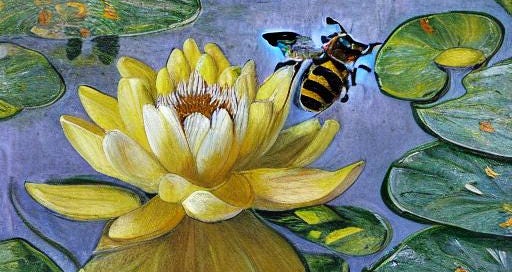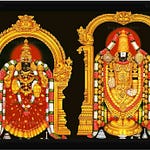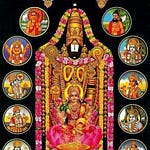Today's verse from the Śrī Veṅkaṭeśa Suprabhātam is a very picturesque one, and reminds me in particular of verse 8 in the way that its imagery compels us to seek out deeper layers of meaning.
bhṛṅgâ-’’valī ca makaranda-rasâ-’nuviddha- jhaṅkāra-gīta-ninadaiḥ saha sevanāya | niryāty upānta-sarasī-kamalô-’darebhyaḥ Śeṣâdri-śekhara-vibho! tava suprabhātam || (VSu 10) भृंगा-ऽऽवली च मकरन्द-रसा-ऽनुविद्ध-झंकार-गीत-निनदैः सह सेवनाय । निर्यात्य् उपान्त-सरसी-कमलो-ऽदरेभ्यः शेषाद्रि-शेखर-विभो ! तव सुप्रभातम् ॥
Row upon row of black bees drenched in nectar their buzzing a veritable drum-fest emerge, birthed from the wombs of lotuses that skirt the edges of sacred ponds just for a taste—of You: O all-pervading Almighty atop Śeṣâdri, a blessed morning unto You!
A literal interpretation of the verse
On the surface, this verse is easy enough to understand: The sun has arisen enough that the lotuses in Tirupati have blossomed enough that the bees that were trapped in them overnight are now managing to escape. So what?
We know that bees buzz around and collect nectar from flowers. Indeed these particular bees got trapped in the flowers overnight precisely because they were too busy taking up nectar and ignored the sunset the previous evening! (That, incidentally, is a major interpretive hint for us, as we will soon see.)
So what does it mean that these bees flew away from the flowers in the morning?
The sun and the Supreme Sun
First of all, it means that the lotuses have now blossomed open susbtantially. This is in contrast to verse 7, where they were only īṣat-praphulla “slightly blossomed”. This suggests that, between verses 7 and 10, enough time has elapsed for the sun to rise properly and hence for the lotuses to blossom open, freeing their bee-prisoners.
However, we see that there is no explicit mention of the sun here causing the lotuses to blossom.1 This is not a problem; after all, it is common knowledge (at least in a pre-modern world where people observed Nature closely) that the blossoming of lotuses is correlated with, and indeed caused by, the sun’s rays.
Luckily for us, the absence of an explicit mention of the sun opens up another interpretive possibility: these lotuses are among the lotuses brought to Lord Veṅkaṭeśvara for His morning worship, and so when they come into sight of His face that outshines the sun and moon2, they blossom open automatically and immediately, releasing their bee-prisoners.
To serve and to enjoy
These bees buzz around, still covered in nectar (), and they home right in on Lord Veṅkaṭeśvara and Padmāvatī Tāyār for sevana. This word has two almost opposite meanings, and we will see that both carry great importance here.
Sevana can mean “to taste, to enjoy”.3 That is, the bees which emerge from regular lotuses and which are addicted to regular nectar turn their attention to the Lord’s lotus-face and lotus-lips and lotus-hands and lotus-feet, and seeking a taste of the infinitely more delicious amṛta (ambrosia) promised by these celestial lotuses, they fly to them.
Sevana can also mean “to serve”, and remembering that we are still in a musical context (parrots singing, Nārada playing his veena), we can see that the bees act as musicians in the Divine Court as well—they are percussionists!
A deeper layer of meaning
But what does all this stuff about bees and lotuses mean for us? The key interpretive hints for us here are the following:
The bees were trapped in the lotuses overnight because they were addicted to nectar and didn't pay heed to the setting of the sun.
The lotuses opened up in the morning through contact with the rays of either the rising sun or of the face of the Divine Lord. (And even if we go with the first option, we should remember that the shining of the sun and the rotation of the earth all occur due to the Divine anyway.)
Freed from the lotuses but still drenched in nectar, the bees now turn to the Divine Duo for sevana which is either “service” or “tasting” (or really both).
This is a good depiction of us!
We are the bees that chase after petty pleasures in ephemeral lotuses, and in our greed we get trapped in them when darkness falls.
When, by the grace of God, our circumstances change and we find an escape from such entrapment, we should turn away from fading, transient, worldly “lotuses” and towards the eternal, infinite source of immortal nectarine love: the Divine Duo and their eternal love for Each Other and for each of us.
The heart of the matter
One further mystery remains: How do we make sense of the double meaning of sevana in this verse? In a way, it doesn’t matter at all! Aṇṇan Swami seems to be saying that the specific reasoning for why we turn to the Divine is actually not that important at all:
We can turn to the Divine out of a sense of “service” and vairāgya—detachment from, even distaste for, worldly affairs.
Or we can turn to the Divine out of a desire for even greater enjoyment and anubhava—taking pleasure in the material delights of the world, no longer for their sake, but rather because we come to see how even the material pleasures and beauties of this world are really simply manifestations of the infinite beauty and glory of the Divine.
Most remarkably, we can turn to the Divine Duo even while we are still makaranda-rasâ-’nuviddha, dripping with the nectar4 that got us into trouble in the first place! This is one of the best parts of this verse. We are not obliged to achieve some mystical state of purity before coming to delight in the pure presence of the Divine Duo—indeed, we cannot get rid of our past karma or our material imperfection. But as this verse makes clear, that is utterly irrelevant. Neither our state of purity nor our intention matters quite as much as the fact that we present ourselves before the Divine Duo and that we celebrate Them in whatever way we can.
What a glorious verse this is!
|| Śrī-Padmāvatī-nāyikā-sameta-Śrī-Śrīnivāsa-parabrahmaṇe namaḥ ||
Indeed, we will see exactly that phrasing later on in the Suprabhātam itself, in verse 26: bhāsvān udeti.
As Āṇḍāḷ puts it in the first verse of the Tiru(p)-pāvai, He is kadir-madiyam pōl mukhattān (கதிர் மதியம் போல் முகத்தான்): “One whose face is like the sun and moon”, or alternatively, “one whose face is like the radiant moon”.
We see this particular meaning of the word sevan in modern Hindi expressions for smoking (dhūmra-pān kā sevan धूम्रपान का सेवन) and tobacco chewing (tambākū kā sevan तंबाकू का सेवन).
As the Brahmānanda-vallī of the Taittirīya Upaniṣad famously puts it: raso vai saḥ “He is Nectar, indeed.” In this case, anuviddha can be understood not just as “drenched” but as “soaked through”, “pervaded by”. We, the wandering bees, are in fact pervaded in and out by the all-pervading Divine who is the supreme aesthetic experience personified.











Share this post